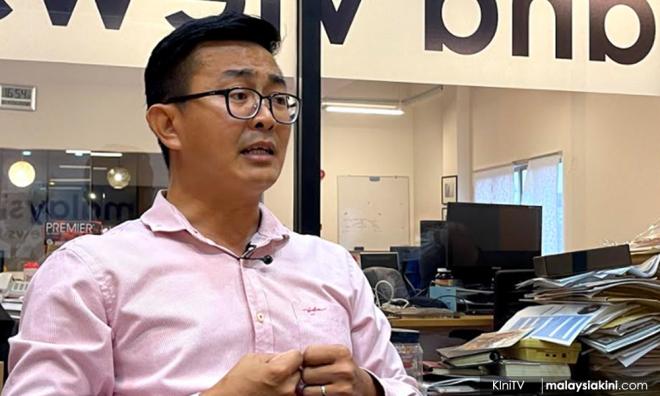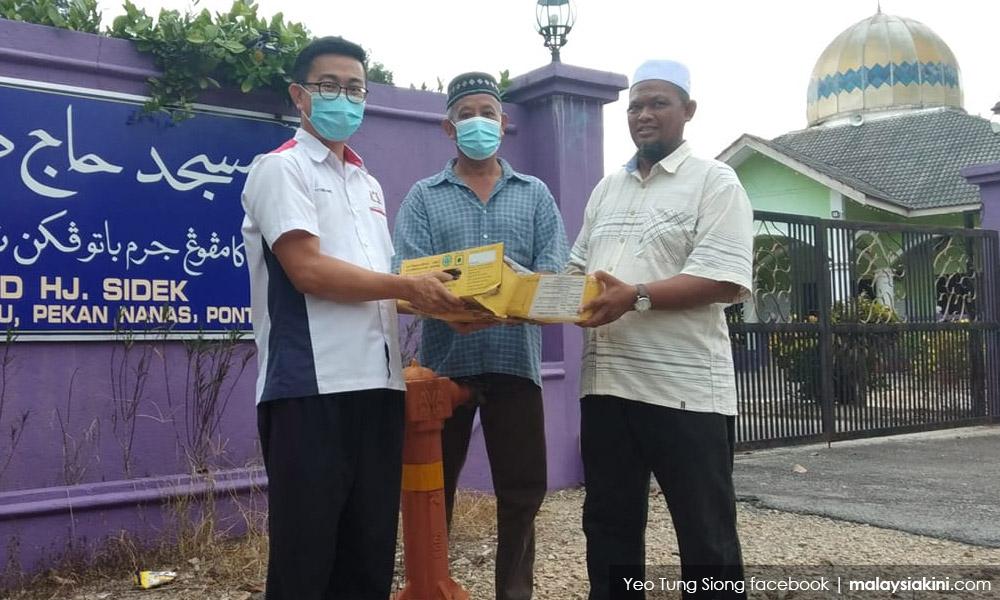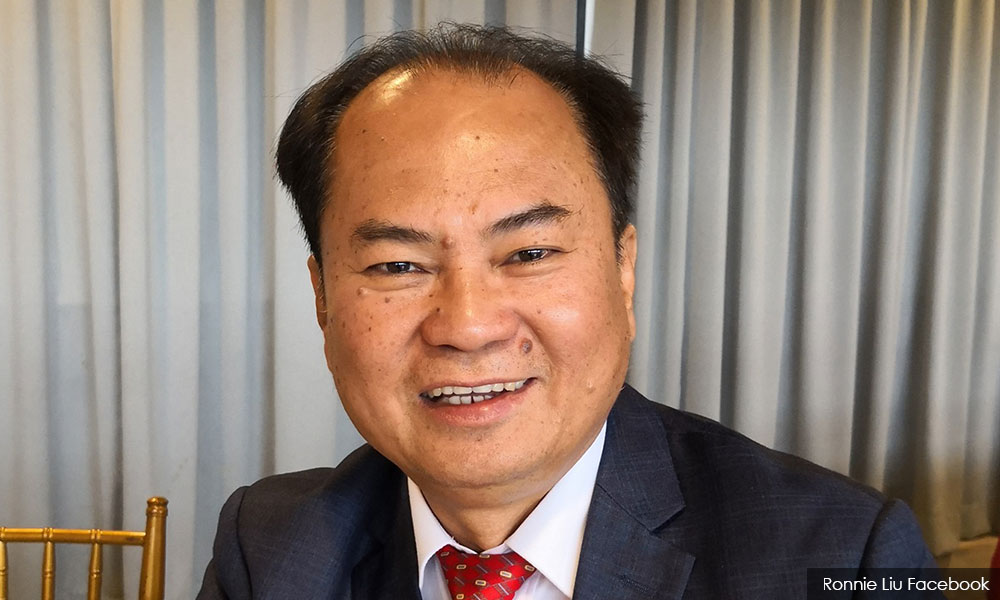
DAP 'devil' tells how he shed horns in Malay heartland
Yeo Tung Siong believes that DAP can win over the hearts and minds of Malay voters without being accused of degrading itself in the process.
In an interview with Malaysiakini, the Pekan Nanas assemblyperson recalled his personal experience with regard to Malay constituents when he first contested the Johor state seat eight years ago.
Yeo, a teacher-turned-politician, said his campaign material, which included banners of DAP's top leaders, were defaced with “horns and fangs” during the 2013 general election.
"The banners either disappeared or were vandalised.
“They were defaced with devil horns and fangs. The narrative was DAP is evil," he said, adding that those images still remain fresh in his mind.
On his campaign trail at a Malay kampung, Yeo (above) said a villager chided him for turning up only during an election to hoodwink people into supporting DAP.
Against all odds, he managed to unseat MCA, which controlled the seat since it was created in 2004. Yeo secured 53 percent of the votes in the Chinese-majority mixed constituency, winning with 2,669 votes.
At the time, Pekan Nanas comprised 58 percent Chinese voters while Malay voters were 39 percent of the total electorate.
However, the redelineation exercise prior to the 2018 general election turned Pekan Nanas into a Malay-majority mixed seat with 54 percent Malay voters. Chinese voters comprised 45 percent while Indian voters stood at one percent.
In an interview with Malaysiakini, the Pekan Nanas assemblyperson recalled his personal experience with regard to Malay constituents when he first contested the Johor state seat eight years ago.
Yeo, a teacher-turned-politician, said his campaign material, which included banners of DAP's top leaders, were defaced with “horns and fangs” during the 2013 general election.
"The banners either disappeared or were vandalised.
“They were defaced with devil horns and fangs. The narrative was DAP is evil," he said, adding that those images still remain fresh in his mind.
On his campaign trail at a Malay kampung, Yeo (above) said a villager chided him for turning up only during an election to hoodwink people into supporting DAP.
Against all odds, he managed to unseat MCA, which controlled the seat since it was created in 2004. Yeo secured 53 percent of the votes in the Chinese-majority mixed constituency, winning with 2,669 votes.
At the time, Pekan Nanas comprised 58 percent Chinese voters while Malay voters were 39 percent of the total electorate.
However, the redelineation exercise prior to the 2018 general election turned Pekan Nanas into a Malay-majority mixed seat with 54 percent Malay voters. Chinese voters comprised 45 percent while Indian voters stood at one percent.

Pekan Nanas assemblyperson Yeo Tung Siong distributing aid.
Despite this, Yeo managed to retain the seat with a majority of 1,308 votes. He secured 52 percent of the votes in Pekan Nanas.
The Malay votes for him also increased to more than 25 percent.
Dispel animosity to win their trust
Commenting on the change in mindset, Yeo attributed it to his hard work on the ground.
"Over time, they (Malay voters) were willing to speak with me.
“This year, I attended the funeral of a Foodpanda delivery person who died in an accident. His father spoke of his son's last wish, which was to repaint the main entrance to the kampung.
“So we participated in a gotong-royong to repaint the structure.
"The father is an Umno member. But no matter who the person is, a relationship can be built when people communicate with each other. This dismantles any suspicion,” he added.
Citing another example, Yeo said he learned that a Malay stall operator's wife was diagnosed with cancer and highlighted the matter on social media.
“When I went to a stall later, I bumped into the operator's nephew from Johor Bahru, who told me he learned of his aunt's ailment from my Facebook post,” he added.
According to Yeo, it is crucial to dispel any animosity before earning the trust of Malay voters.
"If the constituents harbour hostility (towards DAP), it will be useless even if you distribute 10 million leaflets. You will not make any progress even if you struggle for half a century.
"In the past few years, I have been to many places, the people I meet invite me into their homes and serve me drinks.
“They may not vote for you but at least they are no longer hostile (towards a DAP politician),” he added.
Supports 'blue ocean' strategy
Yeo said DAP, which is witnessing an internal debate after Sungai Pelek assemblyperson Ronnie Liu remarked that it should protect its "Chineseness", should increase its efforts to gain the support of the Malay community.
The Malay votes for him also increased to more than 25 percent.
Dispel animosity to win their trust
Commenting on the change in mindset, Yeo attributed it to his hard work on the ground.
"Over time, they (Malay voters) were willing to speak with me.
“This year, I attended the funeral of a Foodpanda delivery person who died in an accident. His father spoke of his son's last wish, which was to repaint the main entrance to the kampung.
“So we participated in a gotong-royong to repaint the structure.
"The father is an Umno member. But no matter who the person is, a relationship can be built when people communicate with each other. This dismantles any suspicion,” he added.
Citing another example, Yeo said he learned that a Malay stall operator's wife was diagnosed with cancer and highlighted the matter on social media.
“When I went to a stall later, I bumped into the operator's nephew from Johor Bahru, who told me he learned of his aunt's ailment from my Facebook post,” he added.
According to Yeo, it is crucial to dispel any animosity before earning the trust of Malay voters.
"If the constituents harbour hostility (towards DAP), it will be useless even if you distribute 10 million leaflets. You will not make any progress even if you struggle for half a century.
"In the past few years, I have been to many places, the people I meet invite me into their homes and serve me drinks.
“They may not vote for you but at least they are no longer hostile (towards a DAP politician),” he added.
Supports 'blue ocean' strategy
Yeo said DAP, which is witnessing an internal debate after Sungai Pelek assemblyperson Ronnie Liu remarked that it should protect its "Chineseness", should increase its efforts to gain the support of the Malay community.

Sungai Pelek assemblyperson Ronnie Liu.
"I agree with the direction of the party's 'blue ocean' strategy, given the demography of the population.
“Many of the Chinese-majority seats will be transformed into mixed seats in 10 years or even to Malay-majority seats in 20 years.
"Without joining the 'blue ocean' and understanding the pulse of Malay voters, DAP will decline over time.
"The Malay electorate has been DAP's weakest spot over the decades, we must overcome this. You can talk about 'Hua Sha' (Chinese chauvinists) and 'Ying Sha' (English chauvinists), but my feeling is that the Malay community focuses on what the politicians are doing," he added.
Yeo also said he disagreed with DAP's practice of fielding “parachute candidates” during elections.
"If the situation permits such as when there is a political wave (of change) in the 2013 and 2018 polls, then it is understandable if you want to send more good candidates into Parliament or state assemblies.
"But when the situation is not favourable and the candidates are not winnable, the person must work hard for a long time (to overcome the odds)... Will a 'parachute candidate' be able to stay on to complete this task?
“How will the grassroots perceive this? Will they think that these candidates only appear during elections and disappear after?” he added.
Calling on the DAP leadership to exercise caution on this issue, Yeo said such scenarios would frustrate both the voters and the grassroots, leading to disputes.
In the 2013 general election, DAP heavyweights like Lim Kit Siang, Liew Chin Tong and Teo Nie Ching moved from their original parliamentary constituencies in other states to contest in Johor. All three won.
In 2018, Liew, who is also Johor DAP chief, moved again. This time from Kluang to contest against MCA president Wee Ka Siong in Ayer Hitam. Liew lost by a narrow margin of 303 votes.
Yeo, who is also Johor DAP assistant organising secretary, is seen as belonging to another camp that opposes Liew, who is speculated to face a challenge in the May 2 state party polls.
“Many of the Chinese-majority seats will be transformed into mixed seats in 10 years or even to Malay-majority seats in 20 years.
"Without joining the 'blue ocean' and understanding the pulse of Malay voters, DAP will decline over time.
"The Malay electorate has been DAP's weakest spot over the decades, we must overcome this. You can talk about 'Hua Sha' (Chinese chauvinists) and 'Ying Sha' (English chauvinists), but my feeling is that the Malay community focuses on what the politicians are doing," he added.
Yeo also said he disagreed with DAP's practice of fielding “parachute candidates” during elections.
"If the situation permits such as when there is a political wave (of change) in the 2013 and 2018 polls, then it is understandable if you want to send more good candidates into Parliament or state assemblies.
"But when the situation is not favourable and the candidates are not winnable, the person must work hard for a long time (to overcome the odds)... Will a 'parachute candidate' be able to stay on to complete this task?
“How will the grassroots perceive this? Will they think that these candidates only appear during elections and disappear after?” he added.
Calling on the DAP leadership to exercise caution on this issue, Yeo said such scenarios would frustrate both the voters and the grassroots, leading to disputes.
In the 2013 general election, DAP heavyweights like Lim Kit Siang, Liew Chin Tong and Teo Nie Ching moved from their original parliamentary constituencies in other states to contest in Johor. All three won.
In 2018, Liew, who is also Johor DAP chief, moved again. This time from Kluang to contest against MCA president Wee Ka Siong in Ayer Hitam. Liew lost by a narrow margin of 303 votes.
Yeo, who is also Johor DAP assistant organising secretary, is seen as belonging to another camp that opposes Liew, who is speculated to face a challenge in the May 2 state party polls.
No comments:
Post a Comment